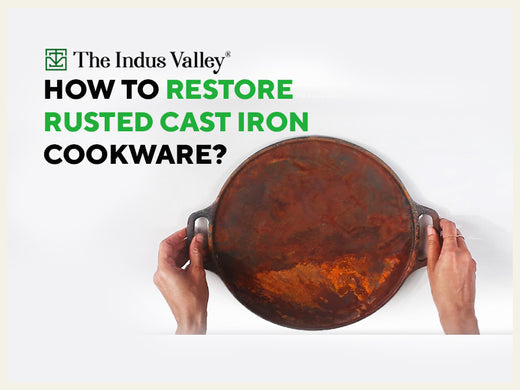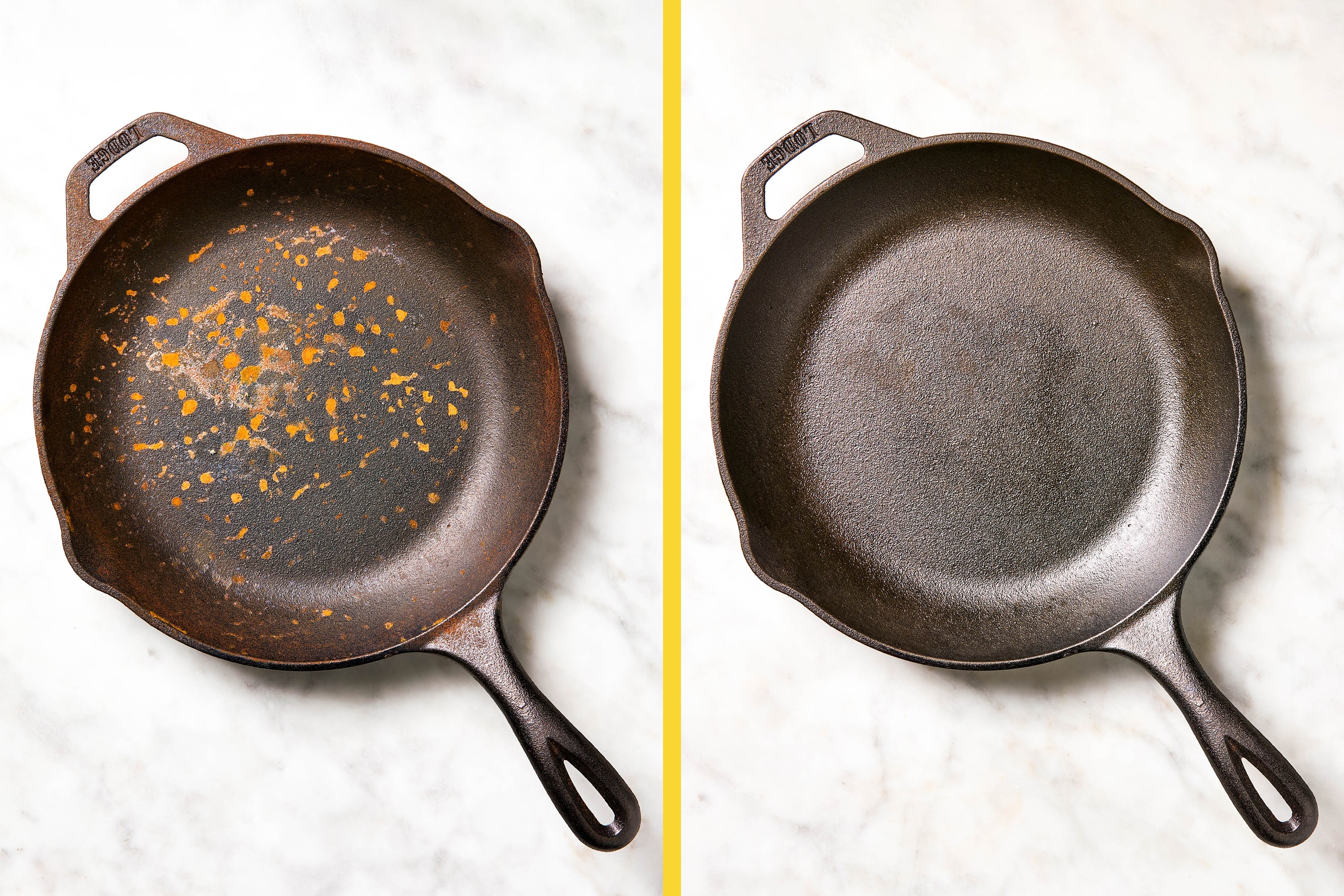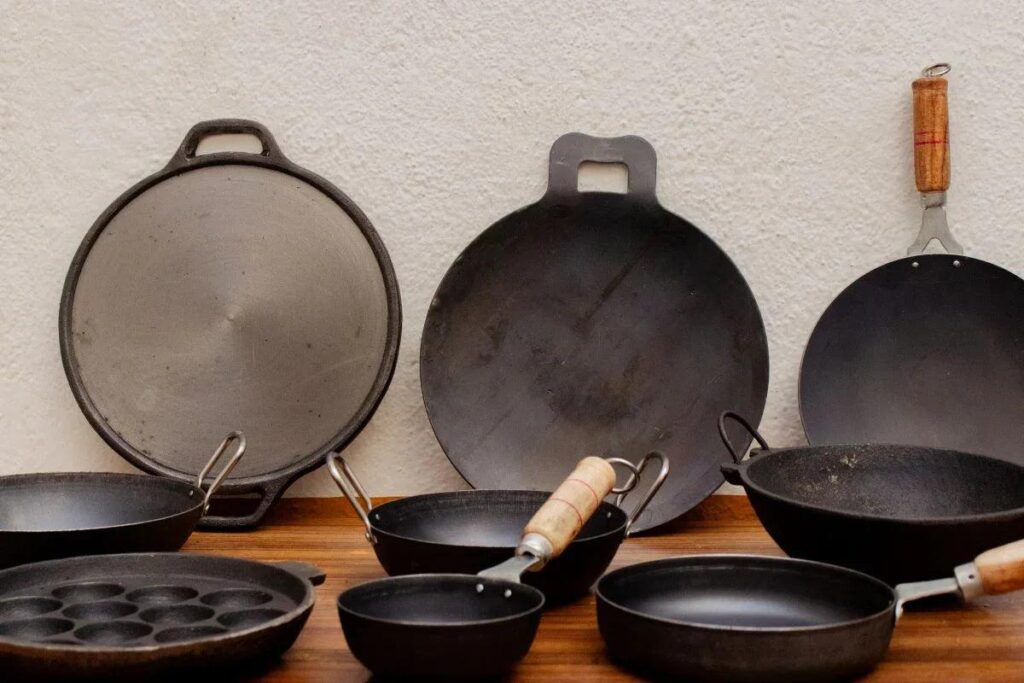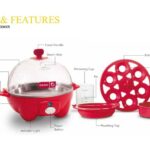Are you tired of finding rust spots on your beloved cast iron cookware? You’re not alone.
Many cast iron owners encounter this frustrating problem, but the good news is that it’s entirely preventable. Your cast iron pans and pots are precious tools in the kitchen, offering unmatched heat retention and adding a delightful flavor to your dishes.
However, without proper care, they can quickly become rusty and less effective. By understanding a few simple strategies, you can keep your cast iron in pristine condition for years to come. Imagine the satisfaction of using your rust-free cast iron cookware, knowing every meal you prepare is cooked to perfection. Let’s dive into the secrets of maintaining your cast iron, so you can enjoy your cooking experience without the hassle of dealing with rust.

Credit: www.souschef.co.uk
Seasoning Techniques
Seasoning your cast iron cookware is key to preventing rust. This process creates a protective layer on the surface. It enhances the cookware’s non-stick properties. Proper seasoning can extend the life of your cast iron.
Let’s explore some effective seasoning techniques. These will help keep your cookware in great shape.
Choose The Right Oil
Select an oil with a high smoke point. This ensures better seasoning results. Popular choices include vegetable oil and flaxseed oil. These oils create a durable layer.
Apply The Oil Evenly
Coat the entire surface with a thin layer of oil. Use a cloth or paper towel to spread it evenly. Cover both the inside and outside of the cookware. This uniform layer prevents rust and improves seasoning.
Heat The Cookware
Place the cookware in an oven set to 375°F. Let it bake for about an hour. This allows the oil to bond with the surface. The heat creates a smooth, protective layer.
Repeat The Process
Seasoning is not a one-time task. Regularly repeat the process to maintain the protective layer. Frequent seasoning keeps the cookware rust-free and ready for use.
Proper Cleaning Practices
Keep cast iron cookware rust-free by drying it completely after washing. Apply a thin oil layer to protect. Store in a dry place to maintain its condition.
Proper cleaning practices are essential to prevent rust on your beloved cast iron cookware. With just a few mindful steps, you can ensure your pans remain in top-notch condition, ready to serve up delicious meals for years to come. Have you ever wondered if you’re really cleaning your cast iron correctly? Let’s dive into some practical tips to keep those pans rust-free.Use Warm Water And Minimal Soap
Rinse your cast iron with warm water immediately after cooking. This helps to remove food particles before they dry and stick. A small drop of mild dish soap can be used, but don’t overdo it.Avoid Soaking
Leaving your cast iron submerged in water is a surefire way to invite rust. Always aim to wash it quickly and dry it immediately. Think of it as a quick spa treatment for your cookware, not a leisurely bath.Skip The Dishwasher
Dishwashers are convenient, but they’re no friend to cast iron. The high humidity and detergents can strip the seasoning and increase rust risk. Hand washing is your best bet.Dry Thoroughly
After washing, use a clean towel to dry your cookware completely. Water is the enemy here. For extra assurance, place it on a low burner for a few minutes to evaporate any lingering moisture.Re-season After Cleaning
Once dry, apply a thin layer of vegetable oil to your cast iron. This maintains the seasoning and creates a barrier against moisture. Regular re-seasoning is a small step that makes a big difference in preventing rust.Store Properly
Ensure your cast iron is completely dry before storing it. Stack it with a paper towel between pieces if you have multiple pans. This not only prevents moisture build-up but also protects against scratches. Do you have any cleaning tips or personal stories about cast iron maintenance? Share your thoughts in the comments below and join the conversation! By adopting these simple cleaning habits, you’re not just preserving cookware but also safeguarding countless culinary adventures.Optimal Storage Methods
Proper storage is key to maintaining cast iron cookware. Without it, rust can form quickly. Ensuring your cast iron is stored correctly will extend its life. It will also keep your cookware in top condition for years. Let’s explore some optimal storage methods to prevent rust.
Store In A Dry Place
Moisture is the enemy of cast iron. Always store your cookware in a dry place. A cupboard or pantry works well. Make sure the area has good air circulation. This keeps moisture away from your cookware.
Avoid Stacking
Stacking cast iron can lead to scratches and moisture traps. Store each piece separately. If space is limited, use paper towels between items. This prevents scratches and absorbs any moisture.
Use Protective Covers
Protective covers shield your cast iron from dust and moisture. Use breathable cloth covers. Avoid plastic as it traps moisture. This simple step can prevent rust effectively.
Regular Inspection
Check your cast iron regularly for signs of rust. Early detection makes cleaning easier. Wipe down with a dry cloth if needed. Regular checks keep your cookware in great shape.
Store With Silica Gel Packs
Silica gel packs absorb moisture. Place them near your cast iron. This keeps the area dry. A simple, effective way to fight rust.

Credit: www.theindusvalley.in
Daily Maintenance Tips
Keep cast iron cookware rust-free by drying thoroughly after washing. Apply a thin layer of oil. Store in a dry place. Regular seasoning enhances protection against moisture, ensuring longevity and performance. Simple care keeps your cookware in top condition.
Maintaining your cast iron cookware daily is crucial to keep rust at bay. It’s not just about preserving its appearance; it’s about ensuring your meals taste great and your cookware lasts for years. Daily maintenance might sound demanding, but it’s really about forming simple habits. These habits will help you enjoy the benefits of cast iron without worrying about rust, which can often sneak up on those who neglect their cookware.Clean Immediately After Use
Cleaning your cast iron right after cooking prevents food residue from sticking and turning into rust. Use warm water and a gentle brush to remove food particles. Avoid soap as it can strip the seasoning. If needed, use a small amount of coarse salt as a scrub to tackle stubborn bits.Dry Thoroughly
Never leave your cast iron to air dry. After rinsing, use a clean towel to wipe it dry immediately. Moisture is rust’s best friend, and ensuring your cookware is bone-dry will keep rust at bay. Consider placing it on a stove for a few minutes to evaporate any remaining water.Apply A Light Coat Of Oil
Once dry, rub a thin layer of vegetable oil or olive oil all over the cookware. This step not only helps maintain the seasoning but also creates a barrier against moisture. Remember, a little oil goes a long way; too much can make your cookware sticky.Store Properly
Where do you keep your cast iron? It’s important. Store it in a dry place away from humidity. If stacking with other pots and pans, place a paper towel between them to absorb any moisture and prevent scratches. This ensures your cast iron stays protected even when not in use.Regular Inspection
Make it a habit to inspect your cookware for any signs of rust. Spotting rust early allows you to take immediate action before it worsens. A quick look can save you from long-term damage and keep your cookware in pristine condition. Do you take these steps with your cast iron cookware? By incorporating these daily maintenance tips, you can extend the life of your cookware and enjoy its benefits without the hassle of rust.Restoration Of Rusted Cookware
Keep cast iron cookware rust-free by drying it completely after washing. Apply a thin layer of oil before storing. Store in a cool, dry place to avoid moisture. Regular maintenance ensures long-lasting, rust-free cookware.
Restoring rusted cast iron cookware can seem daunting, but it’s a rewarding process that brings your beloved pans back to life. Imagine the satisfaction of using a skillet that looks and performs like new. With a little effort and the right technique, you can extend the life of your cookware.Identify The Rusted Areas
Before diving into restoration, take a moment to inspect your cookware. Look for red or orange spots that indicate rust. These areas need immediate attention to prevent further damage.Gather Your Supplies
You’ll need some basic tools to restore your cookware. A few essentials include steel wool, mild dish soap, and a non-metallic scrubber. Ensure you have these on hand before starting the restoration process.Scrub The Rust Away
Gently scrub the rusted areas with steel wool. Apply firm pressure but be careful not to scratch the surface too much. Continue until you see the shiny metal underneath.Wash Thoroughly
After scrubbing, wash the cookware with warm water and mild dish soap. This step removes residual rust particles. Rinse thoroughly to ensure no soap remains.Dry Completely
Dry your cookware immediately and thoroughly. Use a clean cloth or towel to absorb all moisture. Any leftover water can lead to more rust.Re-season Your Cookware
Once dry, it’s time to re-season your cookware. Apply a thin layer of vegetable oil to the entire surface, including handles. Place it upside down in a preheated oven at 350°F for an hour. This step restores the protective layer and prevents future rust.Store Properly
To keep your cookware rust-free, store it in a dry place. Avoid stacking them without protection, as moisture can get trapped. Consider placing a paper towel between pans. Restoring rusted cookware is not just about maintenance; it’s about preserving history and memories. Have you ever restored a family heirloom and felt the connection it brings? That same feeling applies here. Your cast iron cookware can serve you for generations if cared for properly.
Credit: www.thekitchn.com
Frequently Asked Questions
How Do I Stop My Cast Iron Pan From Rusting?
Dry your cast iron pan thoroughly after washing. Apply a light layer of vegetable oil and store in a dry place. Regularly season the pan by heating it with oil. Avoid soaking in water and use mild soap. Keep moisture away to prevent rust.
What Is The Best Rust Preventative For Cast Iron?
Rust preventative sprays like CRC 3-36 are excellent for cast iron. These sprays provide a protective barrier. Regular application ensures optimal protection against moisture and rust. Always clean and dry the surface before application. For long-term storage, consider using a rust-inhibiting paper or vapor capsules.
Why Does My Cast Iron Rust Every Time I Wash It?
Cast iron rusts after washing due to moisture exposure. Always dry it thoroughly and apply a light oil layer. This creates a protective barrier, preventing rust. Proper care ensures your cast iron stays rust-free and lasts longer. Avoid air-drying or leaving water on the surface to maintain its quality.
Do You Need To Oil Cast Iron After Every Use?
Yes, oil your cast iron after each use to prevent rust and maintain its non-stick surface. Clean thoroughly, dry completely, then apply a thin layer of oil. Use a paper towel to evenly coat all surfaces. Regular oiling keeps your cast iron in optimal condition for cooking.
How Do I Clean Cast Iron To Prevent Rust?
Dry cast iron thoroughly after washing. Apply a thin oil coat. Store in a dry place.
Conclusion
Caring for cast iron cookware keeps it rust-free and functional. Regular cleaning is key. Dry your cookware thoroughly after washing. Apply a light coat of vegetable oil to protect it. Store in a dry place to prevent moisture buildup. Use low heat to avoid damaging the seasoning.
Avoid acidic foods that can strip the seasoning. With proper care, your cookware will last for generations. Enjoy cooking delicious meals without worry. Embrace the charm of well-maintained cast iron cookware. Happy cooking and rust-free adventures await!







